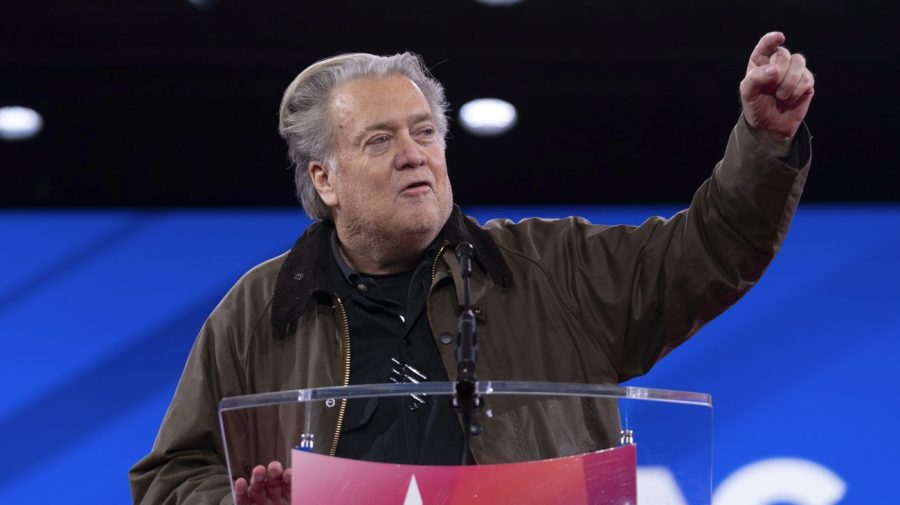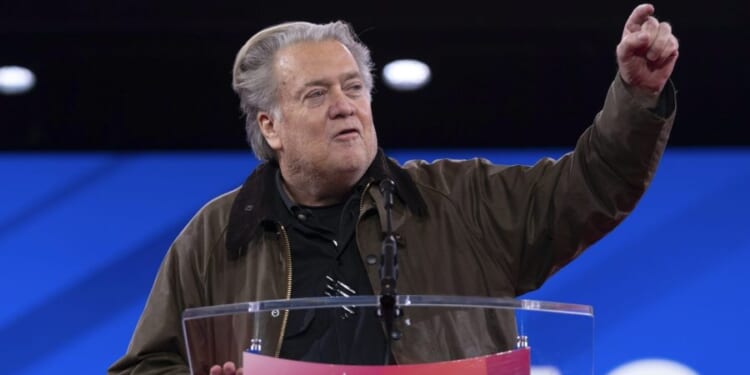
Former White House strategist Steve Bannon leaned into President Trump’s aspirations for a third term, suggesting Trump will run and win in 2028 while denying his own presidential ambitions.
“I’m a firm believer that President Trump will run and win again in 2028, so I’ve already endorsed President Trump,” Bannon told NewsNation’s Chris Cuomo. “A man like this comes along once every century, if we’re lucky, we’ve got him now.”
“He’s on fire, and I’m a huge supporter. Want to see him again in 2028,” he added in an appearance on “CUOMO.”
Trump has floated the idea of running for a third presidential term a number of times despite it being unconstitutional with the 22nd Amendment limiting politicians to two presidential terms.
He most recently teased a run last week during a White House St. Patrick’s Day event alongside Irish Prine Minister Micheál Martin.
“Taoiseach, I want to just thank you once again for being here, it’s an honor, and hopefully we’re gonna be doing this at least three more times, OK,” Trump said at the time. “We’re gonna be doing this three more times, at least.”
“When I say at least they go absolutely crazy,” the president added, referring to the news media. “So thank you very much for being here.”
When Cuomo asked Bannon, who has not fully ruled out his own 2028 White House bid, how he plans to secure another term for Trump, the former strategist said the wheels are already in motion.
“We’re working on it. I think we’ll have, I think we’ll have a couple of alternatives,” he said Tuesday. “Let’s say that. We’ll see, we’ll see, we’ll see what the definition of term limit is.”
Bannon also suggested that after Trump’s defeat in the 2020 election to former President Biden, Trump had to make the “longest of long shots” to return to the Oval Office in 2024. But he cleared it, winning the GOP presidential primary and ultimately beating former Vice President Harris in November.
“And we had to get organized and drive that victory and also start working on all the policies. What’s called Project 2025 or the America First Policy Institute … but all those different think tanks that started putting in the policies that you’re seeing today in what we call ‘flood the zone,’ or ‘Days of Thunder,’ or however you want to describe it,” Bannon said.
“But this is many years in the making, so we’ve had greater long shots than Trump 2028 and we’ve got a lot of stuff we’re working on there,” he added. “We’re not prepared to talk about it publicly, but in a couple of months, I think we will be.”
In January, Rep. Andy Ogles (R-Tenn.) proposed an amendment to the Constitution that would permit Trump to serve a third term in the White House.
“No person shall be elected to the office of the President more than three times, nor be elected to any additional term after being elected to two consecutive terms, and no person who has held the office of President, or acted as President, for more than two years of a term to which some other person was elected President shall be elected to the office of the President more than twice,” the amendment said.
Ogles said at the time that Trump has “proven himself to be the only figure in modern history capable of reversing our nation’s decay and restoring America to greatness, and he must be given the time necessary to accomplish that goal.”
Some of the president’s supporters were also seen wearing “Trump 2028” stickers at last month’s Conservative Political Action Conference.
Democrats on Capitol Hill have strongly rebuked the possibility.
Rep. Dan Goldman (D-N.Y.) put out a resolution in February reiterating the lower chamber’s support for the 22nd Amendment.
“Resolved, That the House of Representatives (1) reaffirms that the Twenty-second Amendment applies to two terms in the aggregate as President of the United States; and (2) reaffirms that the Twenty-second Amendment prohibits President Trump from running for President for another term,” it reads.
A YouGov poll, released late last month, found that 52 percent of Americans think that Trump will attempt to remain in the White House. When asked about it, 21 percent said “definitely” while another 31 percent said “probably.”










